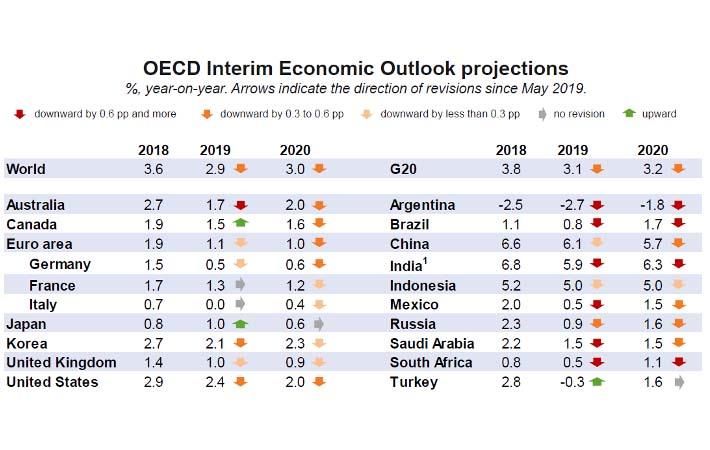Interviews
Trade tensions, policy uncertainty to weaken growth: OECD
23 Sep '19
3 min read

Pic: OECD
The global economy has become increasingly fragile and uncertain, with growth slowing and downside risks continuing to mount, according to the Organisation for Economic Cooperation and Development’s (OECD) latest Interim economic outlook, which says economic prospects are weakening for both advanced and emerging economies.
Global growth could get stuck at persistently low levels without firm policy action from governments, the report says.
Escalating trade conflicts are taking an increasing toll on confidence and investment, adding to policy uncertainty, aggravating risks in financial markets and endangering already weak growth prospects worldwide.
The OECD projects that the global economy will grow by 2.9 per cent in 2019 and 3 per cent in 2020—the weakest annual growth rates since the financial crisis, with downside risks continuing to mount.
The outlook covers all G20 economies, and includes downward revisions to projections from the previous outlook released in May 2019 for almost all countries, particularly those most exposed to the decline in global trade and investment that has set in this year, according to an OECD press release.
The report identifies the trade conflicts as the principal factor undermining confidence, growth and job creation across the world economy, and underlines that continuation of trade restrictions and political uncertainty could bring additional adverse effects.
While solid consumer demand has supported service sector output to date, persistent weakness in manufacturing sectors and continuing trade tensions could weaken employment growth, household income and spending.
Substantial uncertainty persists about the timing and nature of the withdrawal of the United Kingdom from the European Union, particularly as concerns a possible no-deal exit which could push the UK into recession in 2020 and lead to sectoral disruptions in Europe.
Other risks, including the overall slowdown in the Chinese economy and significant financial market vulnerabilities from the tension between slowing growth, high debt and deteriorating credit quality, are also weighing on future growth.
The report calls on central banks to remain accommodative in the advanced economies, but stresses that the effectiveness of monetary policy could be enhanced in many advanced economies if accompanied by stronger fiscal and structural policy support.
It says fiscal policy should play a larger role in supporting the economy, by taking advantage of exceptionally low long-term interest rates for wider public investment to support near-term demand and future prosperity. Greater structural reform ambition is required in all economies to help offset the impact of the negative supply shocks from rising restrictions on trade and cross-border investment and enhance medium-term living standards and opportunities. (DS)
Global growth could get stuck at persistently low levels without firm policy action from governments, the report says.
Escalating trade conflicts are taking an increasing toll on confidence and investment, adding to policy uncertainty, aggravating risks in financial markets and endangering already weak growth prospects worldwide.
The OECD projects that the global economy will grow by 2.9 per cent in 2019 and 3 per cent in 2020—the weakest annual growth rates since the financial crisis, with downside risks continuing to mount.
The outlook covers all G20 economies, and includes downward revisions to projections from the previous outlook released in May 2019 for almost all countries, particularly those most exposed to the decline in global trade and investment that has set in this year, according to an OECD press release.
The report identifies the trade conflicts as the principal factor undermining confidence, growth and job creation across the world economy, and underlines that continuation of trade restrictions and political uncertainty could bring additional adverse effects.
While solid consumer demand has supported service sector output to date, persistent weakness in manufacturing sectors and continuing trade tensions could weaken employment growth, household income and spending.
Substantial uncertainty persists about the timing and nature of the withdrawal of the United Kingdom from the European Union, particularly as concerns a possible no-deal exit which could push the UK into recession in 2020 and lead to sectoral disruptions in Europe.
Other risks, including the overall slowdown in the Chinese economy and significant financial market vulnerabilities from the tension between slowing growth, high debt and deteriorating credit quality, are also weighing on future growth.
The report calls on central banks to remain accommodative in the advanced economies, but stresses that the effectiveness of monetary policy could be enhanced in many advanced economies if accompanied by stronger fiscal and structural policy support.
It says fiscal policy should play a larger role in supporting the economy, by taking advantage of exceptionally low long-term interest rates for wider public investment to support near-term demand and future prosperity. Greater structural reform ambition is required in all economies to help offset the impact of the negative supply shocks from rising restrictions on trade and cross-border investment and enhance medium-term living standards and opportunities. (DS)
Fibre2Fashion News Desk – India
Popular News
































-Ltd..jpg?tr=w-120,h-60,c-at_max,cm-pad_resize,bg-ffffff)





.jpg?tr=w-120,h-60,c-at_max,cm-pad_resize,bg-ffffff)
.jpg?tr=w-120,h-60,c-at_max,cm-pad_resize,bg-ffffff)






